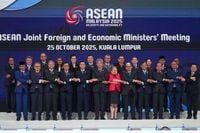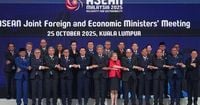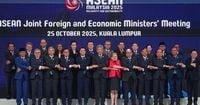East Timor’s long journey to regional integration reached a historic milestone on October 25, 2025, as the nation was formally admitted as the newest member of the Association of Southeast Asian Nations (ASEAN) during a ceremony in Kuala Lumpur, Malaysia. The moment was marked with both celebration and reflection, as leaders from across Southeast Asia gathered to witness the flag of East Timor—also known as Timor-Leste—join the other ten on the ASEAN stage. For Prime Minister Xanana Gusmao, this was more than just a diplomatic achievement; it was, in his words, a “dream realized.”
“Today, history is made,” Gusmao declared to the assembled leaders, his voice echoing the sentiments of a nation that has weathered decades of hardship and struggle. “For the people of Timor Leste this is not only a dream realized, but a powerful affirmation of our journey—one marked by resilience, determination and hope.” According to the Associated Press, Gusmao’s remarks set the tone for a summit that would be defined by both optimism and pragmatism.
The ceremony kicked off ASEAN’s annual summit, which this year promises two days of high-level engagements with key global partners, including China, Japan, India, Australia, Russia, South Korea, and the United States. The event’s significance was heightened by the arrival of U.S. President Donald Trump, making his first trip to Asia since returning to the White House. Trump’s presence underscored the summit’s broader geopolitical importance, as he participated in the signing of an expanded ceasefire agreement between Cambodia and Thailand—a conflict he claimed to have helped broker earlier in the summer.
“There was a lot of killing. And then we got it stopped, very quickly,” Trump said before the agreement was signed by Cambodian Prime Minister Hun Manet and Thai Prime Minister Anutin Charnvirakul. Calling it a “momentous day,” Trump emphasized the ceasefire’s terms: Thailand would release 18 Cambodian soldiers held prisoner, and both countries would begin removing heavy weapons from the tense border area. The U.S. president also announced the signing of economic agreements with both Cambodia and Thailand, and noted that a trade deal with Malaysia was on the horizon.
East Timor’s accession marks the first time ASEAN has expanded its membership since the 1990s—a process that itself took over a decade to achieve. The last country to join was Cambodia in 1999, highlighting just how rare and significant such moments are for the bloc. For East Timor, a country with a GDP of around $2 billion and a population of 1.4 million, the move represents a chance to access a regional market of 680 million people and a $3.8 trillion economy.
Malaysian Prime Minister Anwar Ibrahim, whose country currently holds ASEAN’s rotating chairmanship, captured the spirit of the occasion. “East Timor’s accession completes the ASEAN family, the affirming of our shared destiny and deep sense of regional kinship,” he said, as reported by the Associated Press. Ibrahim also outlined ASEAN’s broader mission: “to pursue growth that is both resilient and fair, and to safeguard the welfare of generations to come.”
For the region’s youngest and poorest nation, ASEAN membership is both a validation and a challenge. East Timor’s history is a tapestry of colonial rule, conflict, and hard-won independence. Wedged between Indonesia and Australia, the country was a Portuguese colony for over four centuries before declaring independence in 1975. That freedom was short-lived; Indonesia invaded nine days later, plunging the nation into a brutal 24-year occupation. Tens of thousands died through conflict, famine, and disease. It wasn’t until a United Nations-supervised referendum in 1999 that East Timor’s path to independence was paved, culminating in formal nationhood in 2002.
Today, East Timor is led by two of its independence heroes: Prime Minister Gusmao and President Jose Ramos-Horta, the latter a Nobel Peace Prize laureate in 1996. Together, they face daunting socioeconomic challenges. About 42% of the population lives below the national poverty line, and nearly two-thirds of citizens are under 30 years old—a demographic reality that makes youth job creation a top priority. The nation’s economy is heavily reliant on oil and gas, but with those resources depleting, diversification is no longer just a goal but a necessity.
ASEAN membership offers East Timor access to the bloc’s free trade deals, investment opportunities, and a much broader market. It’s a chance to turn its youthful population and untapped potential into engines of growth. As Gusmao put it, “For us this new beginning brings immense opportunity in trade, investment, education and the digital economy—we are ready to learn, innovate and uphold good government. This is not the end of a journey, this is a beginning of an inspiring new chapter.”
Yet, the road ahead is not without obstacles. Joanne Lin, co-coordinator of the ISEAS–Yusof Ishak Institute’s ASEAN Studies Centre in Singapore, cautioned that “Timor-Leste’s administrative and institutional capacity still lags behind most ASEAN members, and full participation will require sustained technical and financial support from the secretariat and member states.” But she also noted that “its inclusion brings new energy and perspectives—especially on issues like youth empowerment, democratic governance and small-state diplomacy.”
The decision to admit East Timor was not universally embraced at first. Some ASEAN members were skeptical, citing concerns over the country’s readiness to meet the bloc’s administrative and regulatory standards. But over time, those doubts gave way to a sense of shared purpose. Angeline Tan, an analyst with Malaysia’s Institute of Strategic & International Studies, observed that “as protectionism is on the rise, the expansion of ASEAN demonstrates its commitment to regionalism, openness and equal participation.” In her view, the move underscores ASEAN’s “inclusivity and adaptability, especially at a time of geopolitical flux.”
East Timor’s journey to ASEAN membership began in earnest in 2011 with its application, followed by observer status granted in 2022. The timing of its accession—amid global economic uncertainty and rising geopolitical tensions—adds another layer of complexity to its integration. Nevertheless, the nation’s leaders appear undaunted. With the support of its ASEAN partners, East Timor hopes to transform its challenges into opportunities, leveraging regional cooperation to address unemployment, poverty, and the need for economic diversification.
Meanwhile, the ASEAN summit itself reflects the region’s growing importance on the world stage. With leaders from China, Japan, India, Australia, Russia, South Korea, and Canada all in attendance, the bloc’s ability to convene such a diverse group is a testament to its diplomatic clout. As U.S. President Trump’s involvement in the Cambodia-Thailand ceasefire illustrates, Southeast Asia remains a focal point for international diplomacy and economic engagement.
As the summit continues in Kuala Lumpur, the mood is one of cautious optimism. For East Timor, the flag-raising ceremony was more than just a symbolic gesture—it was a signal that the country’s voice will now be heard in the halls of regional power. For ASEAN, the expansion is a reaffirmation of its commitment to inclusivity and shared progress, even in the face of daunting challenges. The next chapter for both is just beginning, and the world will be watching to see how this new partnership unfolds.



